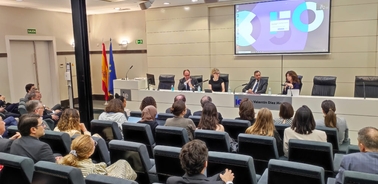- Home
- We Are Law School
- News
- Advancing The Rule Of Law: A Fireside Chat On The Topic Of Access To Justice
Advancing the rule of law: a fireside chat on the topic of access to justice

Hosted by IE Law School, this is the first joint event held between the ICC International Court of Arbitration and the IBA as the beginning of a long-standing friendship and collaboration of two organizations who share a focus on the rule of law as promoting access to justice.
IE Law School recently had the honor of hosting a discussion between Claudia Salomon, president of the ICC International Court of Arbitration (International Chamber of Commerce) and Almudena Arpón de Mendívil, president of the International Bar Association (IBA), on May 9.
The debate was moderated by Alfonso Iglesia, a partner at Cuatrecasas and an ICC member. Also joining them in a conversation about how the ICC, the IBA and lawyers alike strive to advance the rule of law was Marie-José Garot, associate professor at IE Law School and director of the IE Center for European Studies, who made the opening remarks, as well as Jordi Sellarés, Secretary General of ICC Spain; Patricia Saiz, independent arbitrator and member of the ICC International Court of Arbitration; and Soledad Atienza, Dean at IE Law School.
This was the first joint event held between the ICC International Court of Arbitration and the IBA, which Arpón de Mendívil saw as the beginning of a long-standing friendship and collaboration. Both organizations, said Solomon, share a focus on the rule of law as promoting access to justice. The rule of law is, as Arpón de Mendívil noted, about “how to create a better life for us,” adding that we risk taking it for granted. Another risk is the economic gap in access to justice, even though the benefits of equitable access are clear: “For every dollar invested in justice, there is a six-dollar return benefit in terms of reducing the risk of violence.”
Alfonso Iglesia asked what was being done to ensure access to justice globally. Arpón de Mendívil listed the actions taken by the IBA, including their “Look after the rule of law, and it will look after you” campaign. Salomon explained that the ICC International Court of Arbitration, as a global, independent and neutral organization, has the rule of law at its core.
“In these times of uncertainty, strengthening the rule of law is more important than ever.”
Marie-José Garot, associate professor at IE Law School and director of the IE Center for European Studies
The role of technology, while a positive contributor to education and training, also poses risks in the use of algorithms to replace human decision-making. While Salomon felt that AI will transform dispute resolution, Arpón de Mendívil sounded a note of caution, emphasizing that AI can risk increasing the gap in access to justice if not carefully controlled.
Claudia Salomon explained that the ICC International Court of Arbitration provides other services in addition to arbitration, including mediation and facilitating negotiation. In response to a question from Alfonso Iglesia on the role of the states parties within the Court, she confirmed that 25% of current cases involve states. Arbitration provides a neutral forum for both private parties and states, thus ensuring that the rule of law is upheld, and it’s a particularly efficient tool to promote the rule of law. That’s why IE Law School offers a specialization in International Dispute Resolution in its Master of Laws (LL.M.), including a chance for students to receive hands-on training at the ICC International Court of Arbitration.
Arpón de Mendívil suggested two ways in which the legal sector can address environmental, social and governance (ESG) issues: firstly, identifying and prioritizing issues in order to “bring clarity into this cloud of confusion” and secondly, being more proactive. In order to attract and retain talent, legal organizations must demonstrate a commitment to sustainability.
Diversity and inclusion is an essential part of the rule of law—just as it’s one of our own core principles—and the ICC International Court of Arbitration has been focusing on increasing the gender diversity of its community. However, there is still a need to take a broader view, monitoring representation to ensure that the great diversity in the global business community is reflected. Similarly, the IBA has long taken diversity seriously and has created a Diversity and Inclusion Council.
Trust in the legal system is also a vital component. Arpón de Mendívil noted that the public perception of lawyers is key: “We should be seen as contributors to society.” Salomon agreed that “trust is transparency in this era” and that understanding is key to trust.
Finally, looking to the future, the ICC International Court of Arbitration is focused on the next two years and particularly on the experience of both parties in an arbitration dispute. The IBA is prioritizing the promotion of the rule of law, with particular areas of work including ESG, the challenges of digitalization and highlighting the contribution of the legal profession to society.